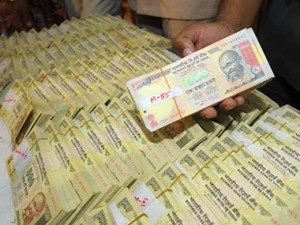
While releasing the survey on demonetisation to remonetisation process, Mr. Gopal Jiwarajka, President, PHD Chamber said that there is a mixed response from the economists, businesses and people.
Majority of the economists (81% Respondents) have cited a significant impact on India’s economic growth in the shorter term but the benefits of demonetization will help in sustaining economic growth in the longer term.
Survey of economists, businesses and people on a structured questionnaire was undertaken by the PHD Research Bureau of PHD Chamber of Commerce and Industry during the month of December 2016.
The survey got responses from more than 50 economists and analysts, 700 business firms and 2000 people.
In the business segment, 73% respondents are facing huge cash crunch due to demonetization as they are unable to fulfill their daily cash requirements to pay wages to daily wagers and contractual workforce.
Production process not only in the informal sector but also in the formal sector has been impacted directly or indirectly, said the survey.
Cash driven segments such as fruits and vegetable markets, horticulture and floriculture, agricultural and food processing, construction activities, among others have been impacted.
But the immediate effect would probably be short-lived and the long term effect will drive the Indian economy to new areas of growth in the coming times, said the survey study Though the contraction in GDP cannot be ruled out due to fall in economic activity, growth in demand will start gaining momentum once the economy moves out of the transition stage of demonetization to dremonetisation, said Mr. Gopal Jiwarajka
It is expected that removal of black money from the system would create a good scope for reduction in interest rates via-a-vis lower inflationary expectations and reduce the incidence of direct taxation, he said
While assessing the impact on people, 92% Respondents said that the major impact of currency crunch is seen on daily needs of the people such as purchase of eatables, dairy products and other necessities, according to the survey 58% Respondents are facing high level of difficulty in fulfilling their day to day activities. 89% Respondents reported unavailability of cash at banks and ATMs as a major hurdle in withdrawing/depositing cash from the bank/ATMs, said the survey study.
There is a need of setting up of digital literacy booths outside banks majorly in rural regions for spreading digital literacy across all sections of the nation, said Mr. Jiwarajka Government should incentivize RTGS (Real Time Gross Settlement) and NEFT (National Electronic Funds Transfer) under the ambit of digital transfers so that more and more people adopt the available facility and are less dependent on cash transactions.
The threshold limit of Rs. 2,00, 000 for transactions under the RTGS and Rs. 50,000 for transfers under NEFT should be exempted from the service tax.
Also, removal of service tax charged while making payments through credit/ debit card or any other payment card up to Rs. 2,000 in a single transaction is a good start for the transformation of cash transactions to the digital transfers, however, the limit could be revised to Rs. 10,000.
Government should print more and smaller denominations such as Rs. 50, 100 and Rs. 500 notes so that there should be sufficient circulation of money in the market. Government needs to ensure that the sufficient quantity of money is being transported to the banks and ATMs in both rural and urban areas on time, he said
Facility of mobile ATMs in the Government, public sector and private corporate sector offices having more than 25 employees in their establishments, he added
Cash driven sectors such as constriction sector and Small and Micro Units (SMEs) should be facilitated by expanded cash limits for the payment of salaries of their daily wage and contractual workers, said Mr. Gopal jiwarajka. There is a need for low interest rates to propel a boom in Housing and Real Estate. This will substantially increase Employment as well as contribute towards GDP growth, he said







Leave a Reply
You must be logged in to post a comment.